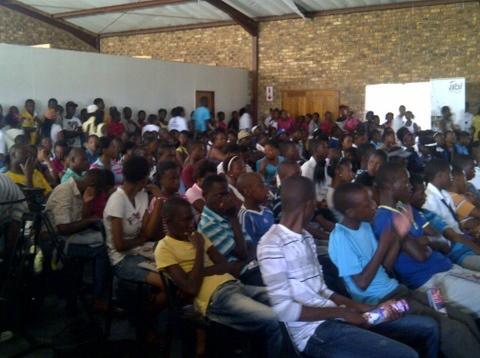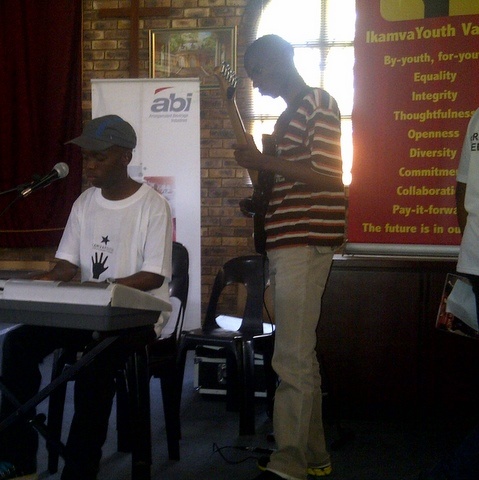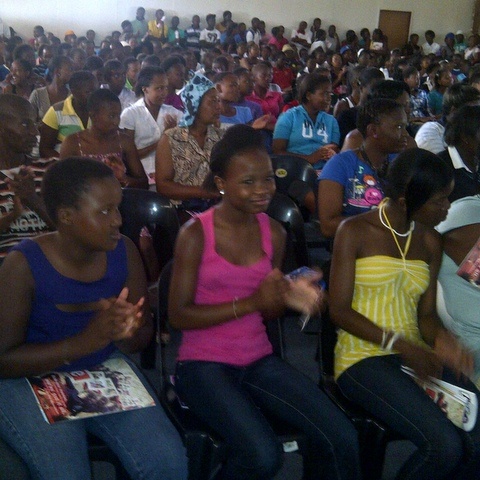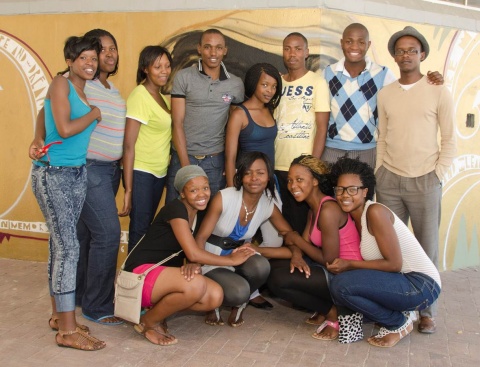
IkamvaYouth Gauteng hosted a very successful Open Day this past Saturday, 21st of January 2012, at the IkamvaYouth Centre in Ebony Park. The day started at 9:30 am with a spectacular turn out of over 700 people. The hall was filled to capacity and there was a hub of excitement from the learners, parents, volunteers and other supporters.

Several activities took place with the Branch Co-ordinator, Joe Manciya, introducing IkamvaYouth to all those who attended. He encouraged the learners to take their education seriously as their future is in their hands and pointed out that IkamvaYouth in Gauteng had opened a second branch located in Ivory Park. The day was filled with lots of information and fun, with Ikamvanites providing entertainment through music and dance. The successful Ikamvanites who matriculated in 2011 also got a chance to speak to the crowd, encouraging their peers to take their education more seriously by becoming an Ikamvanite.
Several sponsors were present, including ABI and The Tzu Chi Foundation. ABI, which was represented by Beverly Selepe, their CSI Specialist, donated the branding that was used on the day, t-shirts, beverages and entertainment. The Tzu Chi Foundation was represented by Howard and announced that they had made four, R20 000 scholarships available to the 2011 successfully matriculated Ikamvanites towards their tertiary education. These successful matriculated Ikamvanites were strongly encouraged to apply.

In conclusion, the Open Day was a resounding success, many of the learners took the application forms after the presentations and IkamvaYouth is looking forward to a very successful 2012 with all your continued support.


IkamvaYouth learners from township and rural schools achieve 85% pass rate; 42% of which are bachelor passes.
“Today my life begins and I’m so happy” – Anathi Malindi, Grade 12 learner from Nyanga.
Speaking on SAFM on 4th January, Graeme Bloch said that “you have to go to a model c school if you want to do well in matric”. And although the country is celebrating the 70.2% national matric pass rate, analysts agree that this figure masks the inequalities in achievement and access to tertiary study. With learners at township and rural schools severely under-performing, it appears that the higher the school fees the better one’s chances of academic achievement.
Yet IkamvaYouth’s volunteers and learners have once again shown that excellent results are possible, irrespective of which school one attends. There were 100 Grade 12 learners enrolled at IkamvaYouth in 2011, and of the 85% that passed, 42% obtained bachelor passes. This is remarkable given that only 24.3% bachelor passes were achieved nationally; the far majority by ex-model c schools. Two Western Cape branches with their first grade 12 classes did particularly well (Masiphumelele achieved 96% pass; Nyanga 93%), and the Ivory Park branch led the pack with a 100% pass rate). Overall, 70% of learners have achieved the bachelor or diploma passes they need to access tertiary education.

Matriculants at Makhaza Branch, Khayelitsha
IkamvaYouth sets no academic pre-requisite for enrollment in the programme. Most learners join with abysmal academic results and are from impoverished homes with unemployed caregivers. During their time with IkamvaYouth, learners dramatically improve their results, access tertiary education, and as Portia Dlamini’s mother in rural KZN hopes, will be able to “carry the family out of poverty”. Many ikamvanites excelled (25 distinctions overall) and – most importantly – many showed significant improvement. “When I joined IkamvaYouth, my third highest mark was 64%, and today I’ve achieved 5 distinctions”, said Shelton Chadya from Ivory Park. Tshepo Lesejane effectively doubled his maths literacy result (39% when he joined; he matriculated with distinction).

Gauteng Branch celebrating Matrics with Branch Coordinator Joe Manciya
Although celebrating the results, IkamvaYouth’s work with the class of 2011 is far from over. 80% of the learners who failed are eligible for supplementary exams, and tutors will ensure that they’re ready to succeed in these exams in March. While many of those who passed have already been accepted by the country’s top universities, there is still work to be done to ensure that none of the class of 2011 become unemployed. The next step is ensuring that all these learners access tertiary education, training, internships, learnerships or employment. “IkamvaYouth will continue to support all our 2011 matrics as they access quality post-school opportunities and become tutors; enabling the following years’ learners to do the same,” says director Joy Olivier.
The tutors who help the learners to reach these heights are all volunteers. Most are university students and many are ex-learners from IkamvaYouth. They’re also the organisation’s greatest benefactors: next year, ikamvanites will be delivering the equivalent of over 3 million rands’ worth of tutoring time to learners in seven communities in three provinces. The result of this phenomenal investment is an intensive, high quality programme that offers ongoing individual attention and support to learners for under R4500 per learner per year.
As well as our volunteers gratitude must be extended to our funders and donors. In particular IkamvaYouth is especially grateful to the DG Murray Trust, EMpower, the Raimondo Trust, the Potter foundation, the Answer Series, ABI, Hatch, African Bank, Cato Manor ABM, AME Africa, the Anglo Chairman’s Fund, SEF, TSiBA, UWC, DUT, Department of Libraries and Information Science, Learning Trust, Bertha Foundation, Dietschweiler Stiftung, the Foschini Group, iKineo, Education Without Borders, World Teach, Zonke Monitoring Systems, and Capitec Bank for their vital contributions this past year. A great shout big shout out also goes to the countless individuals whose time and money has ensured that IkamvaYouth not only continues to operate in challenging economic times, but can grow and expand its reach and impact.
When announcing the results, the Minister of Basic Education pronounced the eradication of inequality a national priority. IkamvaYouth invites everyone to get involved in transforming our nation, one shining future at a time. IkamvaYouth has branches in the Western Cape (Khayelitsha, Nyanga and Masiphumelele); KZN (Chesterville and a new branch opening in Umlazi) and Gauteng (Ivory Park, and a new branch opening in Ebony Park). IkamvaYouth has maintained a matric pass rate of between 83 and 100% each year since 2005, and true credit for these results must go to the learners, volunteers, the branch teams, and the donors.
Congratulations Class of 2011!
If you would like to read IkamvaYouth’s official response to the public servant’s strike then click here – because this isn’t it. This is, instead, some personal reflections with some mixed-animal-based-metaphors on the current schooling situation that may or may not reflect IkamvaYouth’s position.
Lets start with the facts. There are 30 000 schools in South Africa. 1 500 are top schools. 4 500 are ok. And 24 000 are dysfunctional. If you had the unhappy misfortune of attending this last category of school you would quite literally struggle to work out that this means 80% of our schools are not providing an education fit for learners to face a future filled with hope.
So how bad is it really? Well, our Grade 10 average for Maths at IkamvaYouth’s Ebony Park branch is 28% and our Grade 11 average is 29% – and these are learners who put in extra effort to attend supplementary classes. Who knows what the real performance levels are of those learners who are simply going through the motions? In all likelihood we’ll never know because each year the schools tend to “encourage” Grade 11s who are likely to fail not to return for Matric as this will reflect badly on the school’s final results. So, as bad as the matric results are each year, the reality is actually much worse.
Then, consider this: in the last 3 years, we have added R100 billion to the public sector wage bill of which a hefty chunk goes to teachers and this is even before we include the additional R30 billion+ required to foot the current strike demands. Now I’m not sure about you but the last time I walked into the shop and bought something for R100 billion I had pretty high expectations of what I would get in return. And so the elephant in room that everyone seems to be ignoring is what return have we received from the previous increase in salaries?
The answer is surprisingly simple: the return is negative. Over the past few years, the matric pass rate has consistently declined and, if we allow some anecdotal evidence, any IkamvaYouth tutor will contend that the gaps in understanding are actually getting bigger not smaller. So who’s to blame?
The answer to this question is a lot more complicated and the three power brokers (i.e. the unions, teachers and government) each have a lot to answer for. It is surely self evident that the union insistence that union meetings be allowed to take place during school teaching hours and an outright refusal to allow any form of performance management or teacher accountability is problematic. The truth is that most people would support an increase in teacher salaries (and a substantial one at that) and for my mind we shouldn’t stop at 8.6% if we know that the outcome is going to be an increase in the number of learners who access meaningful post-school opportunities. I mean, double the teacher salaries if that means more people can engage productively in the main stream economy but its a big IF. Sadly though, a sizeable number of the teachers themselves are simply not fit to teach and don’t deserve to be paid at all (never mind an increase) – many regard teaching as standing at the front of the class and reading from a textbook and once this is done they are actively disengaged (or at times openly disruptive). This is only further complicated by a government that appears fairly clueless as to how to fix this and it hasn’t helped that they have lost any moral high ground through dubious enrichment schemes to connected individuals and by splurging on unnecessary items like luxury cars, overseas trips and accommodation all the while asking everyone else to tighten their belts.
BUT this is all actually a distraction. The real problem is that the unions, teachers and government officials are relentlessly flogging a dead horse. The amount of time, energy and resources directed at this lifeless creature is phenomenal. In fact, this particular dead horse is more of a dead donkey given its less than impressive history as bantu education and the dubious transition through various forms over the past 16 years. We are so busy beating the OBE out of this poor thing that we haven’t realised it stopped breathing long ago.
Now if you want proof of this then proof will be provided by the startling results at the end of this year. We will notice (I predict) that the 2010 matric results will remain fairly constant with only minor movements up or down. For my mind this should be enough to convince everybody out of their denial. The schooling system is basically so stuffed that a 3 week strike by teachers a month before the final exams (meaning that the vast majority of learners will go into these exams thoroughly unprepared) will barely register on the final results. The good schools will continue to produce good results and the rubbish schools will once more produce the equivalent of a 12 year warehousing process for learners who at least managed to stay in school – which is just about all they will be able to take with them from this process.
So, if its true then that the voice of the unions is far too narrow and the voice of government is far too compromised then what’s the solution? The solution is to locate the missing voice in this whole commotion that is distressingly conspicuous by its absence. We have to ask: where is the voice of learner? where is the voice of the parent? where is the voice of those who stand by those who bear the brunt of this dysfunctionality?
I’ve been listening for a while and besides from some occasional missives from Equal Education it’s a wilderness out there. We have to fix this. How do we do this? I’m hoping you might have some ideas (please comment below). The key question for me is how we re-orientate this discussion to start from the basis of the learner as the most important element of this whole process? I honestly don’t think we can do this without a REVOLUTION and its a revolution that will need to be led by learners and parents. So to the learners and the parents… where are you?








 Lloyd Lungu
Lloyd Lungu